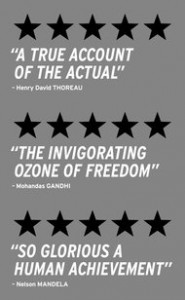
In today’s New York Times editorial (Falser Words Were Never Spoken), Professor Brian Morton*, director of the graduate program in fiction at Sarah Lawrence College, tells us we can’t have it all. We are misled, he claims, by the “shiny, fabulous, gorgeous makeover” of the teachings of our great thinkers, a makeover that strips their wisdom of its subtlety and complexity, leaving us with only illusion and fantasy. Three examples:
A quote attributed to David Thoreau reads as follows: “Go confidently in the direction of your dreams! Live the life you’ve imagined.”
IN FACT, Thoreau said it rather differently in Walden: “I learned this, at least, by my experiment: that if one advances confidently in the direction of his dreams, and endeavors to live the life which he has imagined, he will meet with a success unexpected in common hours.” Rather than suggesting we can each actually live the life we’ve imagined, Thoreau is teaching that we might come closer than we might have imagined, if we just try…
Gandhi has been quoted as saying: “Be the change you wish to see in the world.”
IN FACT, the closest to the verifiable quote from Gandhi is as follows: “If we could change ourselves, the tendencies in the world would also change. As a man changes his own nature, so does the attitude of the world change towards him. … We need not wait to see what others do.” In this more nuanced version, there is greater emphasis on Gandhi’s awareness that one person can rarely change things alone.
And finally, Nelson Mandela, the former South African president, is quoted as saying: “Our deepest fear is not that we are inadequate. Our deepest fear is that we are powerful beyond measure. It is our light, not our darkness that most frightens us. We ask ourselves, Who am I to be brilliant, gorgeous, talented, fabulous? Actually, who are you not to be? You are a child of God. Your playing small does not serve the world…. As we are liberated from our own fear, our presence automatically liberates others.”
IN FACT, self-help guru Marianne Williamson said these words, not Mandela. Odd to picture the latter saying such things as he emerged from 27 years imprisonment, says Morton.
It’s easy, concludes Morton, “to see why the words and ideas [of these men] have been massaged into gauzy slogans. They were inspirational figures, dreamers of beautiful dreams. But what goes missing in the slogans is that they were also sober, steely men. Each of them knew that thoroughgoing change, whether personal or social, involves humility and sacrifice, and that the effort to change oneself or the world always exacts a price.”
——————————————————–
*Brian Morton, director of the graduate program in fiction at Sarah Lawrence College, is the author of the novels Starting Out in the Evening and Breakable You.